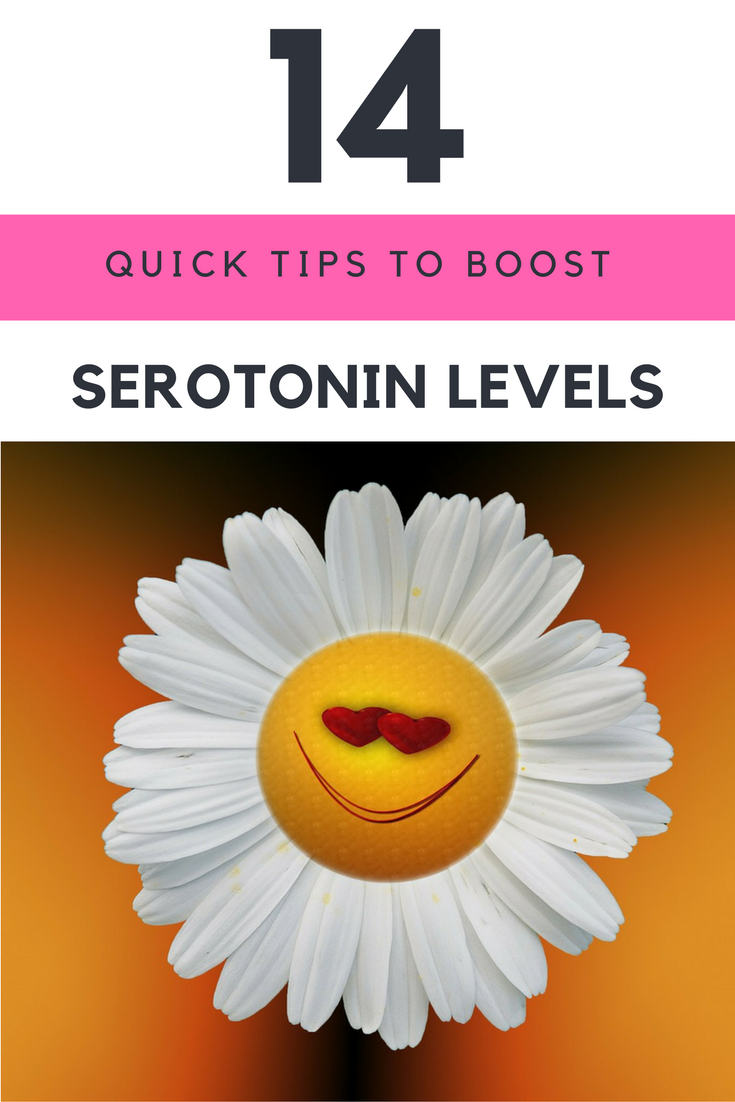 [adinserter block=”1″]Some days, being an adult is hard. House repairs, unending bills, demanding bosses, cranky kids and aging parents all work together to make it feel like life is piling up on you. Wouldn’t it great to be a carefree kid again?
[adinserter block=”1″]Some days, being an adult is hard. House repairs, unending bills, demanding bosses, cranky kids and aging parents all work together to make it feel like life is piling up on you. Wouldn’t it great to be a carefree kid again?
Of course, we can’t go back to childhood. Fortunately, the solution to your woes may not be that difficult anyway. If you’re feeling down and out, the problem might be that you’re low in serotonin.
Serotonin is a neurotransmitter–one of the important chemicals that help your brain and your body function properly. It’s essential for mood regulation, good sleep, healthy appetite, gut wellness and more. When your levels are off, you’re bound to feel off, as well.
Prescription antidepressants are often prescribed for people with low serotonin, but these medications come with side effects and they certainly aren’t all-natural solutions.
Whether you want to avoid medication entirely or would simply prefer to supplement the work that your prescriptions are doing, simple lifestyle changes are a natural way to boost serotonin production.
The 14 tips below will help put a new bounce in your step and a smile on your face every day.[adinserter block=”4″]
Bump up neurotransmitter production with regular exercise.
From a leg-stretching walk to a blood-pumping cardio routine, exercise has the potential to help your mood and raise your serotonin levels. For the most benefit, keep a positive outlook on your workout, rather than thinking of it as a drudgery required for keeping you in good health.
It’s easy to think about it in this light when you remember that, according to Dr. Andrew Weil, not only does physical activity boost serotonin levels, but it also has the power to keep depression relapses at bay.
Make serotonin production possible by getting tryptophan in your diet.
In order to make serotonin, your body relies on the amino acid tryptophan. This video from WaysAndHow, details the importance of tryptophan and lays out suggestions for getting plenty of it in your diet.
The quick overview: Protein-rich foods, such as milk, poultry, eggs, fish and nuts are the best sources of tryptophan, which makes them great serotonin foods.
Cut sugar to avoid the quick-fix trap.
Sugary foods lend a quick rush, which sounds good until you realize that the results don’t last. Sugar helps get tryptophan to your brain, so you might crave it when you’re feeling down, but once the effects wear off, you won’t be any closer to overall serotonin wellness than you were before you stuck that doughnut in your mouth.
Of course, sugary foods taste good, so if you’re looking to add a sweet treat to your diet, try stevia as a better-for-you substitute.
Pair protein with healthy carbs to really get the tryptophan benefit.
Although sugar consumption won’t help your overall serotonin health, you do need some carbohydrates in your diet. The National Sleep Foundation explains that without carbs, your brain doesn’t receive the positive effects of the tryptophan you consume.
Avoid sugar and other simple carbs, and instead pair protein with a small amount of complex carbohydrates, such as vegetables, nuts or brown rice.
Steer clear of a serotonin crash by avoiding alcohol.
An after-work drink sounds like an easy way to unwind, but it may also bring down your serotonin levels. A Medical Council on Alcoholism study found that, 45 minutes after a drink, test subjects had a lower concentration of serotonin in their blood than members of a control group.
The drink might help you feel better for a short time, but in the long run, it’s not an effective solution for low serotonin or depression.
Increase vitamin D with sunlight exposure.
Serotonin doesn’t function independently of other vitamins and minerals in the body; essential for its production is vitamin D. The best place to get vitamin D? Mother Nature dishes it up through sunlight.
To up the amount of sunlight you get in your day, Mayo Clinic recommends trimming back large tree branches, sitting near windows and installing skylights. A daily walk is another good idea; not only will you get sun exposure, but you’ll also get good exercise.[adinserter block=”2″]
Cut pain and and feel happier with a massage.
Have you ever felt like your massage therapist had magic in her fingers? Research shows that there’s a reason you feel so good after a massage.
According to the Touch Research Institutes, multiple studies have shown that test subjects who received regular massages not only reduced their pain levels, but also had higher serotonin levels by the end of the studies.
Get into a good sleep cycle by rising early.
Low serotonin can interrupt your sleep cycles and leave you dragging. However, good sleep improves your mental health. It can be hard to wake early when you’re feeling down, but doing so will help you establish a good sleep-wake pattern.
Take a short midday nap if you need one, but not so long that you won’t be able to fall asleep at bedtime. For a good night’s sleep, the National Sleep Foundation recommends setting your thermostat between 60 and 67 degrees, completely darkening the room, and sleeping on a comfortable mattress.
Avoid serotonin-squashing hormones by cutting out stress.
Natasha Turner, ND, cautions that one of the biggest serotonin killers is stress. When you live with chronic stress, you also live with continually high levels of the hormone cortisol, which negatively affects the amount of serotonin in your body.
To reduce stress, consider these tips from the Anxiety and Depression Association of America:
- Practice yoga and other relaxation techniques.
- Write in a journal.
- Eat regular meals and healthy snacks.
- Take deep, slow breaths when you’re feeling stressed or anxious.
Get the serotonin-boosting effects of a natural SSRI with St. John’s Wort.
St. John’s wort is an herbal supplement that seems to increase the amount of available serotonin in the brain. It’s exact mechanism is unknown, but in some studies, it has beeb more effective than a placebo in treating mild depression.
Mayo Clinic says that some adults take 900 milligrams of the herb twice a day, but the National Institutes of Health warns that St. John’s wort can have risky side effects when used in conjunction with prescription antidepressants, so be sure to let your doctor know about this or any supplements that you are taking.
Keep your brain healthy with B vitamins.
The B vitamins are vital for healthy serotonin production and function. In order for your body to move tryptophan to serotonin, you need to have an adequate supply of B6. SAM-e is another chemical involved in the manufacture of serotonin, and to produce SAM-e, you need B12.
Animal foods, such as fish and poultry, are a valuable source of B vitamins. B6 is also found in some vegetables, such as cauliflower, spinach and celery. With your doctor’s guidance, you might also consider a B-complex supplement.
Lend a hand to serotonin receptors with inositol.
In order to make the most of increased serotonin levels, your serotonin receptors need to be in great shape. Inositol, a member of the B-vitamin group, helps the receptors in your brain function at peak performance.
This supplement is available in powder or capsule form, and 12 to 18 grams per day have been reported to help with depression and other mental health conditions, but it’s wise to work up to that dosage slowly.
Ramp up serotonin production by thinking happy thoughts.
You have some influence over the amount of serotonin in your brain just by controlling the sort of thoughts on which you dwell. Studies have shown that serotonin levels are higher when people think positive thoughts, while sad thoughts actually reduce the amount of serotonin produced in the brain.
In the Journal of Psychiatry and Neuroscience, Simon N. Young called these thoughts “self-induced changes in mood”; in other words, you have the power to decide what to dwell on, whether positive or negative.
Release the “love hormone” oxytocin when you spend time with other people.
Research has shown a link between the hormone oxytocin and the neurotransmitter serotonin, so don’t hesitate to seek out oxytocin boosters, too. To release a wave of oxytocin in your body, Paul Zak, PhD, recommends hugging someone, exercising with a friend or dancing with a partner.
The more time you spend with the people you love, the more oxytocin that will be in your body on a regular basis and the better your overall mental health will be.
All in All, Be Happy & Live Healthy
When life’s got you down, the key to better mental health might be in your own hands. With careful eating, powerful supplements, and a new outlook on healthy habits, you can boost the amount of serotonin produced in your body and how your brain uses it.
Keep in mind that while natural solutions to serotonin deficiency may be helpful for mild depression and moderately low levels of this neurotransmitter, it hasn’t been shown sufficient for severe depression, which should be treated by a doctor.
But for those with the everyday blues, it’s time to make a positive change by putting this list into action. Start with two or three lifestyle adjustments–or even just one if that’s all you feel up to right now.
You’ll soon notice a steady improvement in mood that will be motivation for even more healthy changes down the road.